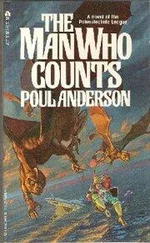Poul Anderson - The Long Way Home
Здесь есть возможность читать онлайн «Poul Anderson - The Long Way Home» весь текст электронной книги совершенно бесплатно (целиком полную версию без сокращений). В некоторых случаях можно слушать аудио, скачать через торрент в формате fb2 и присутствует краткое содержание. Жанр: Фантастика и фэнтези, на английском языке. Описание произведения, (предисловие) а так же отзывы посетителей доступны на портале библиотеки ЛибКат.
- Название:The Long Way Home
- Автор:
- Жанр:
- Год:неизвестен
- ISBN:нет данных
- Рейтинг книги:5 / 5. Голосов: 1
-
Избранное:Добавить в избранное
- Отзывы:
-
Ваша оценка:
- 100
- 1
- 2
- 3
- 4
- 5
The Long Way Home: краткое содержание, описание и аннотация
Предлагаем к чтению аннотацию, описание, краткое содержание или предисловие (зависит от того, что написал сам автор книги «The Long Way Home»). Если вы не нашли необходимую информацию о книге — напишите в комментариях, мы постараемся отыскать её.
The Long Way Home — читать онлайн бесплатно полную книгу (весь текст) целиком
Ниже представлен текст книги, разбитый по страницам. Система сохранения места последней прочитанной страницы, позволяет с удобством читать онлайн бесплатно книгу «The Long Way Home», без необходимости каждый раз заново искать на чём Вы остановились. Поставьте закладку, и сможете в любой момент перейти на страницу, на которой закончили чтение.
Интервал:
Закладка:
His son would not own merely sterile Luna, frigid Mars, poisonous galling hell-hole of Venus. He would have the splendor and mystery of a whole galaxy for range, his metal horses would pasture between the stars.
Langley riffled through the logbook. It was only half a journal, the rest was page after page of data: engine performance, stellar locations, planetary orbital elements, planetary mass and temperature and atmospheric composition, a universe grasped in a few scribbled figures. Somehow, the dryness of it cheered him, brought the chill dark down to a thing he could handle.
Langley stuffed his pipe with the few remaining shreds in his tobacco pouch. There was a trick to lighting it and keeping it going in null-gravity. Thank heaven this ship had been equipped with everything available and a lot unknown before she was built; most boats, you couldn’t smoke at all, oxygen was too costly. But it had been understood that the Explorer would be heading for strange shores. Small though she was, she had the engines and reaction-mass tanks of a cruiser, she could land directly on any planet the size of Earth or less, could maneuver after a fashion in atmosphere, could support her crew for years, could run tests on every imaginable factor of environment. Designing her alone had been a six-year, ten-million-dollar job.
He reflected on the history of space travel. It was not very old. Most engineers had doubted that it would ever become very important. The space stations were useful, the Luna bases had military value, but aside from that the Solar System was a hostile barrenness whose only interest seemed to be scientific knowledge and, possibly, fissionable elements. Then the physics journals had carried an announcement from Paris.
LeFevre was only investigating electron-wave diffraction patterns to test certain aspects of the new unified-field theory. But he had been using a highly original hookup including a gyromagnetic element, and his results—blurred dark rings and splotches on a photographic plate, nothing spectacular at all—were totally unexpected. The only interpretation he could make was that the electron beam had gone from one point to another, instantaneously, without troubling to cross the intervening space.
At California they used the big accelerators to power a massive beam, almost a gram of matter, and confirmed the data. In Kerenskygrad, the theoretician Ivanov had gotten excited and come out with an explanation that fitted the observed facts: the continuum was not four-dimensional, there were no less than eight possible directions at right angles to each other—a modification of the old wave-mechanical hypothesis of one other universe co-existing with ours. The matter had gone through this “hyperspace’; as far as our universe was concerned, it had gone from point to point instantaneously.
Instantaneously! It meant that the stars and their uncounted planets were a wink away!
Ten years of development, and a shell loaded with instruments leaped from a space station near Earth almost to the orbit of Pluto. When it was found by its radiosonde, the instruments said that no time had been required for the passage, and the animals aboard were unharmed. There was only one trouble—it had emerged a good many millions of miles from the point where it was supposed to. Repeated experiments gave a huge percentage of error in the positioning controls, one which would add up hopelessly and dangerously in crossing light-years.
Ivanov and the engineers agreed that this was merely due to the Heisenberg uncertainty principle, whose effects were grossly magnified by the particular circuits used. It was simply an engineering problem to refine the circuits until a spaceship could be brought out almost exactly where she was wanted.
But such work required plenty of room, lest the error pile up the ship on a planet—or even more disastrously, inside one—and so that the instrument readings would be large enough to permit meaningful assays of the result of making changes in the circuits. The obvious answer was to send a laboratory ship out with a crew of experts, who would make improvements, test them with a long jump, and make still further alterations. The answer was known as the United States Interplanetary Ship Explorer .
Langley went through the record of the past year, the erratic leaps from star to star, cursing and sweating in a tangle of wires and tubes, blue flame over soldering irons, meters, slide rules, a slow battle slogging toward victory. One cut—and-try system after another, each a little better, and finally the leap from Holat back toward Earth. It had been the philosophers of Holat whose non-human minds, looking at the problem from an oddly different angle, had suggested the final, vital improvements; and now the Explorer was coining home to give mankind a universe.
Langley’s thoughts wandered again over worlds he had seen, wonder and beauty, grimness and death, always a high pulse of achieving. Then he turned to the last page and unclipped a pen and wrote:
“19 July 2048, hours 1630. Emerged an estimated 0. 3 light-year from Sol, error presumably due to some unforeseen complication in the engines. Attempts to correct same now being made. Position—” He swore at his forgetfulness and went back to the pilot room to take readings on the stars.
Blaustein’s long thin form jackknifed through the air as he finished; the gaunt sharp face was smeared with oil, and the hair more unkempt even than usual. “Can’t find a thing,” he reported. “We tested with everything from Wheatstone bridges to computer problems, opened the gyromagnetic cell, nothing looks wrong. Want we should tear down the whole beast?”
Langley considered. “No,” he said at last. “Let’s try it once more first.”
Matsumoto’s compact, stocky frame entered; he grinned around his eternal chewing gum and let out some competent profanity. “Could be she just got the collywobbles,” he said. “The more complicated a hookup gets, the more it acts like it had a mind of its own.”
“Yeah,” said Langley. “A brilliant mind devoted entirely to frustrating its builders.” He had his coordinates now; the ephemeris gave him the position of Earth, and he set up the superdrive controls to bring him there just outside the remaining margin of error. “Strap in and hang on to your hats, gents.”
There was no sensation as he pulled the main switch. How could there be, with no time involved? But suddenly the spark of Sol was a dull-purple disk as the screen polarized against its glare.
“Whoops!” said Matsumoto. “Honolulu, here I come!”
There was a coldness along Langley’s spine. “No,” he said.
“Huh?”
“Look at the solar disk. It’s not big enough. We should be just about one A. U. from it; actually we’re something like one and a third.”
“Well, I’ll be—” said Matsumoto.
Blaustein’s lips twitched nervously. “That’s not too bad,” he said. “We could get back on rockets from here.”
“It’s not good enough,” said Langley. “We had... we thought we had the control down to a point where the error of arrival was less than one per cent. We tested that inside the system of Holat’s sun. Why can’t we do as well in our own system?”
“I wonder—” Matsumoto’s cocky face turned thoughtful. “Are we approaching asymptotically?”
The idea of creeping through eternity, always getting nearer to Earth and never quite reaching it, was chilling. Langley thrust it off and took up his instruments, trying to locate himself.
They were in the ecliptic plane, and a telescopic sweep along the zodiac quickly identified Jupiter. Then the tables said Mars should be over there and Venus that way- Neither of them were.
After a while, Langley racked his things and looked around with a strained expression. “The planetary positions aren’t right,” he said. “I think I’ve spotted Mars... but it’s green.”
Читать дальшеИнтервал:
Закладка:
Похожие книги на «The Long Way Home»
Представляем Вашему вниманию похожие книги на «The Long Way Home» списком для выбора. Мы отобрали схожую по названию и смыслу литературу в надежде предоставить читателям больше вариантов отыскать новые, интересные, ещё непрочитанные произведения.
Обсуждение, отзывы о книге «The Long Way Home» и просто собственные мнения читателей. Оставьте ваши комментарии, напишите, что Вы думаете о произведении, его смысле или главных героях. Укажите что конкретно понравилось, а что нет, и почему Вы так считаете.











